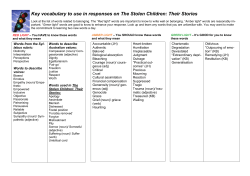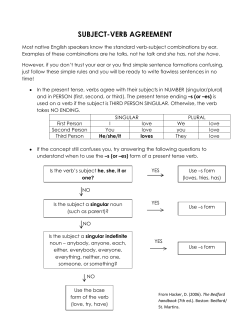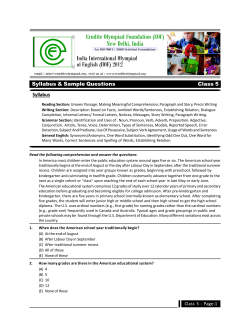
ÙÙÙÙÙÙÙØ° ÙÙ ÙÙÙ ÙÙ ÙÙÙ Ù٠ضÙعÙب ÙÙ ÙÙÙ
Lesson 11: ٌّ بَعْضٌّ ُكلand adverbs of time & place Lesson 11 covers: 1. 2. ٌّ ُك ل ٌّبَعْض 3. Adverbs of time ٌّ ظَرْ ف زمانand place ٌّف مكان ٌُّ ْظَر ٌُّكل Collective noun: Another type of common noun – collective nouns refer to a group of things or people. They are usually singular words that represent a number of people or things. i.e: people, bunch, group ٌّ ُكis a masculine noun. ل It can change case depending on what its position in the sentence is. Because it is a noun, it therefore forms an idaafas construction with a following noun (which would of course be َم ْج ُرورdue to it being mudaf ilayhi) The mudaf ilayhi in this instance, can either be definite or indefinite, and alter in number depending on the meaning of ٌّ ُكلin that moment – which can either mean: 1. Each 2. Every 3. All of ٌُّكل When means “each” or “every” then the Mudaf ilayhi can be either: Indefinite Singular ٌُّكلٌّ نَ ْفس Each soul ٌُّكل When means “all” then the Mudaf ilayhi can be either: Indefinite Plural Definite Singular (if mudaaf ilayhi is a collective noun, or can be divided into separate parts) (if mudaaf ilayhi is a collective noun, or can be divided into separate parts) ٌّن ُكلٌّ أُناس ٌّْ ِم From each people Definite Plural ٌّالطعام ٌّت ُكل ٌُّ أَ َك ْل ِ I ate all of the food ٌّت ِ ُكلٌّ الث َمرا All of the fruits ٌّ ُكلٌّ َذلِ َكmeans all of that Arabic Gems – Lesson 11- page:1 ٌّبَعْض ٌّ بَعْضcan be translated as some. ُ. It works in a similar way to ٌّكل It is also a masculine noun It can change case depending on what its position in the sentence is. It forms an idaafas construction with a following noun, which is always ( َم ْج ُرورdue to it being mudaf ilayhi). The Mudaaf ilayhi should be definite and plural, but it can also be definite and singular if it is a collective noun or can be divided into separate parts. Mudaaf ilayhi with ٌّ بَعْضmudaf Definite Plural Definite Singular (if mudaaf ilayhi is a collective noun, or can be divided into separate parts) ٌّْضٌّ ال ُم ْل ِك ُ بَع ٌّين ُ بَع َ ْضٌّ النَبِي Some of the prophets Some of the Kingdom Be aware of: Sometimes, ٌّ بَعْضcan also mean “one of” For example: ٌّّار ِة ٌُّ بَع َ ْض ال ّسي One of the caravans In one place in the Qur’an, ٌّ بَعْضis followed by an indefinite mudaaf ilayhi. ٌّْض يَوم ٌُّ بَع Part of a day Important to note: ٌّْض ُ ٌّبَعmay appear without the mudaf ilahi! –When this occurs, you will find that usually, it is because ْض ٌُّ بَعis mentioned twice in the same clause, and the mudaaf ilayhi is mentioned following the first ْض ٌُّ بَع. (the 2nd ْض ٌُّ بَعrefers back to the same mudaaf ilayhi as the Sometimes 1st) Arabic Gems – Lesson 11- page:2 In this case, it will usually be translated as “one another” i.e: Complete idaafa ٌّضهُ ٌّْم َعلَىٌّ بَعْض ٌُّ ل بَ ْع ٌَّ ََوأَ ْقب And they approached one another (literally translated as: and some of them approached to some) Verbs, adjectives and predicates with ٌّ ُكand ْض ل ٌُّ بَع idaafas Verbs, adjectives and predicates etc can either agree in number / gender with ٌّ ُكand ْض ل ٌُّ ( بَعi.e: they would be masculine and singular form) or they can agree with the mudaaf ilayhi. In the Qur’an, agreement is usually with the mudaaf ilayhi. i.e: ٌّت ِ ُكلٌّ نَ ْفسٌّ ذائِقَ ٌّةُ ال َمو Every soul is a taster of death Adverbs of time and place Adverbs: An adverb modifies a verb, an adjective or another adverb. The word adverb essentially means “to add to a verb”, and this is what adverbs mostly do. They provide information about how, when, where or how often something is happening, and to what degree. In Arabic, the 2 most common types of adverbs are: ٌّظَرْ ف زمان Adverb of place ٌّف مكان ٌُّ ْظَر 1. Adverb of time 2. The way the adverb is formed is by simply placing a noun that expresses the time/place in the sentence with a fixed َمبْنيfathah (exception: ِ)أَمْس ٌّْض يَ ْوم ٌَّ أوبَع ْ ٌّلَبِ ْثنا يَ ْوما ٌّق ُكلٌّ ِذي ِع ْلمٌّ َعلِيم ٌَّ َوفَ ْو Arabic Gems – Lesson 11- page:3 Lesson 11: Quick revision summary ٌُّكل Masculine noun Case can change Forms an idaafa with following majroor noun Means each or every when mudaaf ilayhi is: 1. Indefinite singular 2. Indefinite plural (when mudaaf ilahi is a collective noun) Means all when mudaaf ilayhi is: 1. Definite singular (when mudaaf ilayhi is a collective noun) 2. Definite plural ٌّ ُكلٌّ َذلِ َكmeans all of that ٌّ – بَعْضmeans some Masculine noun Can change case Forms an idaafa with following majroor nouns Mudaaf ilayhi should be definite and plural - However can be definite and singular if it’s a collective noun Sometimes, ٌّ بَعْضcan also mean “one of” ٌّْض ٌُّ بَعactually ُ بَعappears twice in same clause, with the only 1 mudaaf ilayhi, the 2nd ْض refers back to the mudaaf ilayhi of the 1st ْض ٌُّ – بَعin this case it will usually be translated as one When another. Arabic Gems – Lesson 11- page:4
© Copyright 2025












